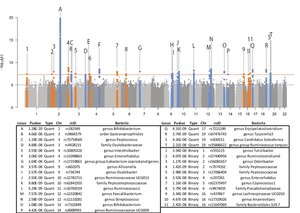An international study has shown that the composition of the intestinal microbiome varies according to human genes.

The MiBioGen (MicroBiome Genome) consortium, in which the cohort research team of Sungkyunkwan University Gangbuk Samsung Hospital (Director Shin-Cheol Shin, Professor Han-na Kim) participated, recently announced the results of a study that identified human genetic factors related to the formation of intestinal microbiome.
The MiBioGen consortium is a meta-analysis of the Genome-Wide Association Study (GWAS) in which 11 countries (Korea, US, Canada, Israel, Germany, Denmark, Netherlands, Belgium, Sweden, Finland, UK) participated. This is the International Cooperation Research Team. The team analyzed human genetic factors that influence the composition of the gut microbiota in more than 18,000 people in a total of 24 cohorts. Gangbuk Samsung Hospital cohort participated as the only Asian team with Korean genome data.
Through this study, the research team identified 31 human genetic loci associated with the intestinal microbiome (Appendix 2), of which 20 loci affect the amount of intestinal microbes, and 11 loci affect the presence of intestinal microbes. Reported giving.

Among them, the mutation in the Lactase (LCT) gene, which makes an enzyme that degrades lactose, is strongly related to the amount of Bifidobacterium that can degrade lactose, and the mutation in the Fucosyl transferase (FUT2) gene is It was confirmed that there was a correlation with the amount of Ruminococcus torques.
In particular, using the genetic mutation information found in this study, as the amount of Bifidobacterium increases, the risk of ulcerative colitis, an inflammatory bowel disease, decreases, and Oxalobacteraceae is associated with rheumatoid arthritis. A causal relationship was found that showed a protective effect. The researchers believe that the protective effect of these specific microorganisms against diseases could be extended to further research, such as the development of therapeutic agents using microbiomes.
In addition, several genes have been found to influence microbiome composition and are involved in important aspects of human metabolism, nutrition and immunity.
Professor Han-na Kim of the research support team at Gangbuk Samsung Hospital who participated in the study said, “This study is a good example of a large-scale international cooperation study, and we accurately evaluated the effect of human genetic factors on the intestinal microbial community.” He added, “Considering the essential role of the intestinal microbiome in the metabolism of food and drugs, we hope that the results of this study will be helpful in developing personalized nutrients and drugs based on the genome data of the human genome and microbial groups.
Director Shin-Cheol Shin of Gangbuk Samsung Hospital said, “It is significant that the only genomic big data and researchers from Gangbuk Samsung Hospital participated in the study to find the genetic locus associated with the intestinal microbiome shared between races. The cohort of Gangbuk Samsung Hospital plans to work harder in the future to achieve the goal of creating a genetic map related to diseases of Koreans.”
Meanwhile, the results of this study were published in the latest edition of the internationally renowned journal Nature Genetics (IF 27.6).
